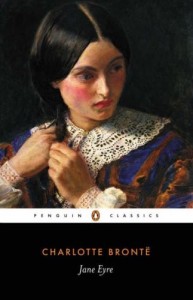Bertha Mason is Edward Rochester’s first wife from Spanish Town, Jamaica. Jane describes her as “purple…the lips swelled and dark”, “savage” with “thick and dark hair” and altogether reminiscent of a vampire (270). She is likewise compared to a beast, specifically a hyena, emphasizing again “dark, grizzled hair” (278). Rochester married her at the suggestion of his money-hungry father and brother and realized too late that she was apparently “bad, mad, and embruted” (278) with “a nature the most gross, impure, depraved” (291). Rochester has not a single kind word for her, save for the impression he first had of her: “tall dark and majestic”, so that Rochester was “dazzled, stimulated: my senses were excited” (290). Rochester depicts Mason as an exotic, dangerous temptress, incapable of modesty, intelligent conversation, or the domesticity 19th century England so cherished. He repeatedly emphasizes her failure to conform to his values: “…her nature wholly alien to [his], her tastes obnoxious to [his]…[he] should never have a quiet and settled household…” (291). Mason provides a perfect and hated Other juxtaposed against the pale, small, reserved Jane Eyre—educated, modest, and sexually chaste. She is “a quiet little figure”, “childish and slender”, and compared to a tiny English bird, the linnet (297). Bertha Mason serves to emphasize Jane’s value as an English woman, with “garb and manner restricted by rule”, a “flower”, an “elf”, a “good angel”, where his first wife had been a “hideous demon” (298-300). Rochester sees each woman in terms of extremes—neither are simply human, but an angel or a little spirit and a beast or a demon. Mason helps to define and accentuate Jane’s value, and by extension, England’s—for when Rochester compares the West Indies to Hell, he also is desperate to “go home to God” (293), so that England, or civilized Europe, is also the heaven to foreign “hell”. After all, it is “a fresh wind from Europe” (293) that prevents Rochester from committing suicide and renews him with hope and a sense of guidance—in a sense, it restores his sanity, especially where suicide would have been an act of insanity. In leaving, however, he brings a piece of this foreign “madness” with him, i.e. Bertha Mason.
Mason is also essential to moving the plot forward. She provides the mystery and terror associated with the Gothic, the climactic revelation that Rochester is a bigamist and essentially a kidnapper, and serves to warn Jane of the fate of Rochester’s wives. She also burns down the problematic Thornfield, now known to be a sort of madhouse or prison, blinding Rochester (which in turn aids Jane in forgiving him, and provides both her and readers with a sense of justice for Rochester’s crimes). She is a sacrificial animal, an interruption to surface-level appearances, which hold a madness of their own, and somewhat ironically, a guardian angel to Jane.

